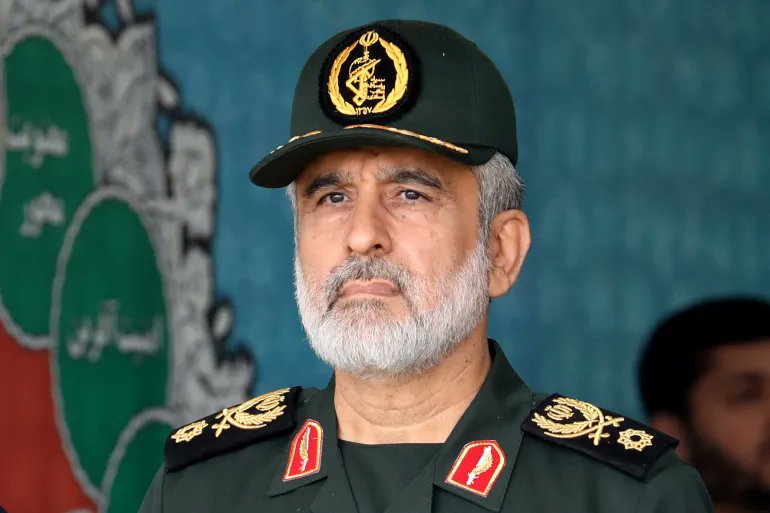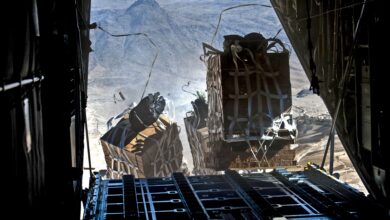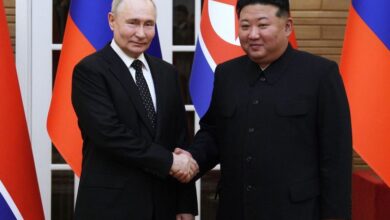IRGC Confirms Death of Seven Top Aerospace Force Commanders in Israeli Strike; Khamenei Appoints Majid Mousavi as New Chief
Iran confirmed the death of seven top IRGC commanders, including Amir Ali Hajizadeh, in an Israeli strike; Majid Mousavi was named his successor.

TEHRAN, Iran. (WE) — The Islamic Revolutionary Guard Corps (IRGC) has confirmed that seven of its top commanders, including Aerospace Force chief Amir Ali Hajizadeh, died in an Israeli strike on Friday morning. Iran blamed Israel for the attack, calling it a terrorist act against sovereign territory.
In a public statement, the IRGC said, “We mourn the deaths of seven of our commanders, including Brigadier General Amir Hajizadeh.” Iranian media described the victims as high-ranking officials who oversaw the country’s missile, drone, and satellite programs.
The Israeli strike reportedly hit a secure IRGC Aerospace Force facility. Satellite images showed heavy damage. Israeli outlets, without direct confirmation from officials, claimed the strike was precise and targeted key military infrastructure.
The Supreme Leader of Iran, Ayatollah Sayyed Ali Khamenei, responded swiftly. On Saturday, he appointed Brigadier General Sayyid Majid Mousavi as the new IRGC Aerospace Force commander. This move ensures the continuity of Iran’s missile and drone development programs.
Khamenei issued the appointment in a formal decree. “In light of the honorable martyrdom of Major General Amir Ali Hajizadeh by the wicked Zionist regime, and based on your valuable experience, I appoint you as the commander of the IRGC Aerospace Force,” he wrote.
Khamenei urged Mousavi to strengthen Iran’s missile readiness and enhance its presence in space. He also emphasized the need for strong ideological training within the ranks. “Advance our strategic capabilities and instill revolutionary values in your personnel,” he added.
The strike has disrupted Iran’s military leadership. Six other commanders also lost their lives in the attack. Though the IRGC has not named them, Iranian sources say they were critical to Iran’s ballistic missile and drone strategies.
Israel has not officially commented. However, its media has described the strike as a major blow to Iran’s military infrastructure. Israeli analysts framed it as a pre-emptive move to disrupt Iran’s regional influence, especially its support for groups like Hezbollah and Hamas.
The IRGC Aerospace Force has played a central role in Iran’s regional military posture. Under Hajizadeh’s leadership, the force developed long-range missiles, launched military satellites, and directed drone operations across the Middle East.
Hajizadeh became widely known in 2020 when Iran launched ballistic missiles at U.S. bases in Iraq in response to the killing of Qassem Soleimani. He also oversaw the Noor-1 and Noor-2 satellite launches, marking Iran’s entry into military space capability.
Despite Hajizadeh’s death, Iran’s officials have promised to continue developing these systems. “His path will not stop,” one IRGC officer told Press TV. “We will strike back at the right time and place.”
Ayatollah Khamenei also appointed Major General Abdolrahim Mousavi as the new Chief of Staff of Iran’s Armed Forces. Mousavi replaces Major General Mohammad Bagheri, who was also killed in Friday’s attack.
Until now, Abdolrahim Mousavi had served as Commander-in-Chief of the Iranian Army. His promotion places him in charge of coordinating Iran’s entire military structure, including the IRGC and regular forces.
Officials say these appointments aim to stabilize the military after the leadership losses. “The enemy thinks martyrdom weakens us,” said an IRGC spokesperson. “But it strengthens our resolve.”
Public mourning ceremonies for the slain commanders have already begun. Large gatherings are expected in Tehran, Mashhad, and Qom. National television will air Ayatollah Khamenei’s address on Monday.
Inside Iran, the strike has sparked outrage and calls for revenge. A top adviser to the Supreme Leader told IRNA that retaliation will come in “a strategic and devastating form.”
The Supreme National Security Council convened an emergency session on Friday night. Officials discussed military responses, cyber retaliation, and political messaging. No formal announcements followed, but insiders suggest Iran is weighing options beyond immediate military strikes.
Meanwhile, Israel remains on high alert. Reports indicate that it has raised its military readiness on northern and southern fronts. The IDF has deployed missile defense batteries in anticipation of potential retaliatory attacks.
In the United States, the Pentagon has increased force protection levels in the Middle East. U.S. officials, while not directly involved in the strike, said they are monitoring developments closely.
International reaction has been cautious. The United Nations, European Union, and Russia have all called for restraint. Observers worry that a full-blown conflict between Iran and Israel could ignite a larger regional war.
Within Iran’s government, the strike has unified political factions. Reformists and hardliners alike have condemned the attack and supported Khamenei’s appointments. Parliament held a special session Saturday, during which lawmakers stood in silence for the fallen commanders.
Brigadier General Majid Mousavi now faces enormous pressure. As Aerospace Force commander, he must preserve the force’s technical edge, defend against further Israeli aggression, and prepare for potential escalation.
Mousavi has long served within the IRGC’s strategic ranks. He previously oversaw missile logistics and played a role in coordinating defense exercises across Iran. Colleagues describe him as a disciplined, hard-line strategist.
Read More:
- Iran Launches Missile Barrage on Israel Following Israeli Strikes on Iranian Infrastructure
- Israeli Strikes Hit Iran’s Nuclear and Military Targets, Revolutionary Guard Chief Reported Killed
- One Survivor Reported as Air India Plane Crash in Ahmedabad Kills 240
His new role will require him to continue expanding Iran’s military capabilities, including space technology and ballistic missile range. He will also have to ensure operational readiness in case of further Israeli strikes.
Mousavi’s leadership begins during a moment of national grief and geopolitical tension. Iranian state media have framed his appointment as both a tribute to Hajizadeh and a signal of future strength.
State broadcaster IRIB aired a documentary on Hajizadeh’s legacy, highlighting his role in resisting Western pressure and developing indigenous defense systems. “He turned sanctions into self-reliance,” the narrator said.
Iran’s missile program has long drawn international concern. Western countries argue that Iran violates UN Resolution 2231, which discourages the development of missiles capable of delivering nuclear warheads. Iran insists its program is defensive.
The IRGC Aerospace Force, under Hajizadeh, became a symbol of that defense. It not only launched satellite payloads but also developed the Khorramshahr, Emad, and Sejjil missile families. Many of these systems can reach targets in Israel and across the Gulf.
Mousavi is expected to continue this legacy. Officials say he will also oversee a new phase of satellite launches, including Noor-3, set for later this year. Iran plans to expand its presence in low-Earth orbit for both military and civilian purposes.
As regional tensions rise, Mousavi’s leadership will be closely watched. Both allies and adversaries will judge how quickly and effectively he can reestablish command and boost morale.
The deaths of Hajizadeh and Bagheri have altered Iran’s defense landscape. But Tehran’s leadership has moved quickly to fill the void and project continuity. The Supreme Leader’s choices signal a commitment to long-term strategic goals, even in the face of sharp losses.
Iran now stands at a crossroads. While it mourns its fallen generals, it also prepares for the next move—militarily, diplomatically, and ideologically. Brigadier General Majid Mousavi, now at the helm of the IRGC Aerospace Force, holds a critical role in shaping that future.















